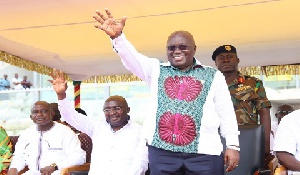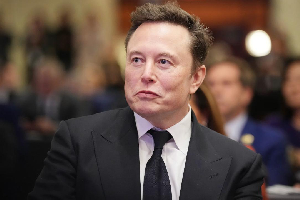The New Patriotic Party, led by then Flagbearer, Akufo-Addo, got Ghanaians very expectant with several promises during the 2016 campaign to improve the country and deal with its woes.
They were given a chance by Ghanaians and they kick-started some of these projects. Obviously, the response from the public was encouraging, and every other time they fulfilled a promise, the faith of Ghanaians somewhat increased.
The implementation, however, did not come without challenges, and as expected of right-thinking persons, there’s always a shove for more.
A few months and they’ll be clocking 3 years in office. There’s still a lot to be accomplished, and many more promises to be fulfilled but www.ghanaweb.com in this piece, takes a look at some decisions by the Akufo-Addo-led administration that has attracted applause from Ghanaians so far.
Free SHS
The Free Senior High School Policy implemented under President Nana Addo Dankwa Akufo-Addo has earned the ruling government some points in the good books of Ghanaians.
Free SHS, as it is popularly called, is a Government of Ghana initiative introduced by the President Nana Akufo-Addo administration in September 2017. The policy had been a major campaign policy prior to the election of President Akufo-Addo in 2016.
The policy targeted at taking the financial burden off the shoulders of parents nationwide, has since its implementation, attracted the citizenry’s appreciation.
Despite having to make little financial contributions to the Parent Teacher Association and others, most parents are relieved they do not have to run around every academic year, scouting for means to pay their ward’s fees.
Like every other policy, it has not been void of challenges but the greater good has been considered mostly when the policy is talked about. In fact, it has become one of government’s most touted feats since it gained power.
A research conducted by the University of Ghana’s Political Science Department which focused on various sectors of governance and economy had 63.5% of the 5000 voters sampled endorsing the Free Senior High School [SHS] programme, making it one of the popular initiatives of the government.
Let’s see some endorsements of the programme from Ghanaians:
Ghanaian parents are grateful to you Mr president Nana Addo Danquah Akuffo Addo for the free SHS policy.
— Abukari Iddrisu (@alooma37) September 26, 2019
Nana Addo making it live#Free Shs pic.twitter.com/CnCSoliR4j
— Edmond Owusu Boateng (@EdmondOwusuBoa2) September 27, 2019
God bless akufu addo(Mr lomotey).He has done well.All Npp members are saying his government is the best, fare, electricity and water the increment is on point..????????.Free SHS is there so will not cry much????????.Aboooooowaaaa.#ShowbizAgenda.
— TJ.TimbuktuByRoad. (@Teejay63) October 1, 2019
Indeed Nana Addo led government and the NPP is ruling the Republic Ghana for a better future.
— John Ansah (@JohnAns22969578) September 30, 2019
MORE WINS 2020 NANA and the NPP HONORABLE MEMBERS MOST IMPORTANTLY THOSE WHO WON THE ORPHAN CONSTITUENCIES, 2020 NPP GO WIN TO CONTINUE THE FREE SHS, ETC. MORE VHIM NANA Y? TAA W'AKYI.
Momo Interoperability
In March 2017, Vice President, Dr. Bawumia commissioned the Mobile Money Interoperability Project and on May 10, 2018, he duly launched the Phase-One at the Marriot Hotel in Accra.
The service allows direct and seamless transfer of funds from one mobile money wallet to another across all networks and creates convenience for users.
The Phase-One of the Project saw the interconnection of the mobile money platforms and the Ghana National Switch (gh-link system), which made it possible for customers to send mobile money across networks and from mobile money wallet to bank account and vice versa.
The Ghana Interbank Payment System (GhIPSS) was tasked to lead the project together with three mobile money operators: MTN, Vodafone and Airtel/Tigo, as well as financial institutions.
Phase Two of the Mobile Money Interoperability platform was launched on November 28, 2019.
The launch of Phase two of the Interoperability platform concludes the Financial Inclusion Triangle, and ensures universal interoperability, making Ghana one of the few countries in the world to attain this feat.
The move earned the ruling government a good name in the hearts and minds of most Ghanaians.
Read some reactions from Ghanaians below:
#MoMoInteroperability means one more giant step towards making digital cash equal to physical cash. Next is ID.. and then innovation shall abound. #LetsGo!!
— Alex Bram (@TheAlexBram) May 10, 2018
Paperless port system
Vice President, Dr. Mahamudu Bawumia, in May 2017, at a Port Efficiency Conference in Accra, announced three-point policy directives aimed at improving Ghana’s Port sector.
That the Ports of Ghana should go 100 percent paperless, all customs barriers should be removed from Ghana’s transit corridor and that there should be Mandatory Joint Inspection at the Ports.
These directives were aimed at improving the competitiveness of the ports and businesses in the country.
Among these, the paperless policy was aimed at improving the clearance procedures at the Ports of Ghana by eliminating delays and transforming Ghana’s Ports to ‘Smart Ports’. This was also to improve ports efficiency for accelerated national development.
It was the expectation of the Vice President that goods should be cleared from the Ports within 4 hours, with this new initiative.
The move so far has resulted in major improvements in trade transactions, helped remove human error from all trade transactions at the ports while strengthening Ghana’s economic competitiveness.
The implementation of the Paperless Port policy phase two, among other things, also reduced the cost of doing business by 75 per cent, attracting mass applause by Ghanaians.
See how some Ghanaians reacted to this new initiative:
People are silent on this easy and faster clearing at the ports now. When it is well we need to appreciate it. Well done @NAkufoAddo for paperless port. pic.twitter.com/57x0MsCcAk
— Kay (@Kwesi_Agyei_) August 27, 2018
The government’s decision to roll out the phase two of the Paperless Port Programme has begun to yield results and made operations at the ports more conducive for importers.
— Tutankhamun. (@Obiba_) May 6, 2019
The policy has resulted in major improvements in trade transactions at the portshttps://t.co/ZjuGEr3rXG
It takes vision
— ASAFO-ADJEI MANDELA (@mandelajunior93) August 15, 2019
It takes courage
It takes leadership to implement bold policies like
1. Free SHS
2. One District One Factory
3. One Village One Dam
4. Paperless Port System
5. Ghana Card
Etc#TheAlternativeIsVeryScary#SayNoToConMahama
Mahama Never Again
Special Prosecutor’s Office
A special Prosecutor’s Office tasked with the sole mandate of investigating and prosecuting public officials was announced by the President and Vice President in 2017.
In June 2017, the Attorney General and Minister for Justice Gloria Akuffo presented the first draft of the Office of the Special Prosecutor bill to stakeholders to pore over government's 'important' anti-corruption legislation.
She told participants at a meeting in Accra, government wants their honest and sincere views on the draft before it is laid before parliament later that year.
Subsequently, the bill was put before Parliament for consideration and passage.
Amidst massive opposition, the bill was finally passed by parliament in November 2017.
Ghanaians endorsed the move by government, many praising government for taking bold steps towards achieving its pledge of ridding the country of corruption.
Recent times however have seen people questioning and demanding measurable work from the Special Prosecutor, Martin Amidu, whom they say has done very little to help his office.
Check out some of the tweets below:
Wow. Well done, Mr President.
— Olivia Adjoa Acheampong (@realadjoapraiz) July 18, 2017
Great, we can't wait koraa.
— ALEXANDER KARL KWAKU KWAYISI (@karlkwayisi_LFC) July 18, 2017
We need the Special Prosecutor paa.
Corruption is the enemy of development, and of good governance,It must be got rid of.l love Nana Addo’s commitment to fight against corruption.Both the government and the people at large must come together to achieve this national objective.
— Barima Nana Sei (@BarimaFreddy) November 14, 2017
Now let see what happens to the corrupt officials
— Kofi Annan???? (@essel_annan) November 14, 2017
Nation Builders Corps
The Nation Builders Corps (NABCO) Programme was introduced by the Akufo-Addo-led government to address graduate unemployment to solve social problems.
The focus of the initiative was to provide temporary employment to unemployed graduates, improve public service delivery and improve skills and employability for transition from programme to permanent employment.
With a 100,000 jobs in mind, in seven (7) prioritised areas, defined as the following modules: Educate Ghana; Heal Ghana; Feed Ghana; Revenue Ghana; Digitise Ghana; Enterprise Ghana; and Civic Ghana, the President launched the initiative in 2018.
The ultimate aim being to help guarantee employability of these graduates, placements would last for a period of three (3) years, earning NABCO trainees a stipend of 700 Ghana cedis every month.
Several youths were enrolled on the programme and this brought joy on many fronts, particularly to the many unemployed out there.
Complaints of salary delays, however, have fraught the move at several points.
Let’s explore some social media reactions:
Good news Mr President
— Franky Five (@francisawuku88) October 18, 2018
We know u are try ur best for Ghana. May God grant u all that u need to make Ghana proud and hoping to hear from u that all the nabco trainings are employed fully.
— Yidan (@Yidan09841096) September 29, 2019
Thank mr president
Ghana card
Government again, in its 2016 Manifesto, promised to get Ghana working through digitization of the economy. As part of efforts to achieve this, he announced the introduction of a new National Identification Card to replace the existing identification cards in the system and serve a broader purpose.
In view of this, a mass registration exercise, conducted by the National Identification Authority (NIA) began on April 29, 2019, in the Greater Accra Region.
Other regions subsequently will have their turn to register for the card which would replace the sectorial identity cards in circulation and shall be the only card to be used in transactions where identification is required as provided by law.
Of course, there were technical challenges encountered by the NIA in the first exercise but they subsequently were solved and as it stands, nearly 3 million persons already have their Ghana Cards as confirmed by the National Identification Authority.
Ghanaians lauded the initiative, hailing government for making efforts towards digitizing the system.
Here are a few of the tweets:
@Kojokaba #DigitalAddressSystem #GhanaCard These are laudable advancements by the President. Hope this doesn't become a NIA scheme. Mike-Tor
— michael larbi (@michellarbi) October 18, 2017
Ghana is finally going for national ID card #Ghanacard pic.twitter.com/gsUYBO6xRd
— Ama Sarpong (@iamasarpong) September 15, 2017
Wow, two years already? Free shs, GhanaCard, Sinohydro, economic stability, dumsor gone, ECG compact, NHIS arrears paid, taxes reduces, paperless port, planting… https://t.co/zanx7xF7YU
— Augustine Blay (@augblay) December 7, 2018
Ghana Post GPS (Jack where are you)
Ghana joined the list of nations hooked on to a digital property addressing system, following the launch of a ‘ghanapostGPS.’ App.
The digital addressing system is a modern approach to allocating addresses within a defined space with the aid of the latest geocoding technology.
This brought a new dimension to finding dimensions, a better option to the former ‘landmark way’ of locating places.
The $2.5 million digital addressing system was expected to provide addresses to 16.1 billion locations in the country – “every 5 by 5 metres square will be provided with an address.”
This app is currently being used as one requirement for the registration exercise for the GhanaCard nationwide.
‘Jack where are you’ indeed brought some relief to the Ghanaian populace as far as locations and directions are concerned.
Below are some of the tweets:
This is impressive. Keep it up
— Alhaji Ishak (@IshAlhaji) December 11, 2017
Ghana post is very efficient especially in their courier services. I always get my stuff from overseas intact and timely. I like the improved parking @Kumasi main. @Abocco @KumasiSocial @KumasiHive @RhondaBoateng #SDG8
— LordGyau (@jayjesselay) February 19, 2018
This is an amazing testimony from a customer who used the ghanapostgps digital address for a parcel she sent to her old man. pic.twitter.com/VsGgmMPvQR
— GhanaPostGPS (@ghanapostgps) December 13, 2017
NHIS debt clearance
The President of the Republic, Nana Addo Dankwa Akufo-Addo, revealed in April 2018, that his administration is reviving the strength of the National Health Insurance Scheme (NHIS), which, under the Mahama government, was being strangled by debt.
“Of the GH¢1.2 billion debt inherited which is equivalent to $300 million, President Akufo-Addo explained that GH¢1 billion, the equivalent of $250 million was paid.”
This he said was aimed at regaining the effectiveness of the scheme so that for a minimum amount, subscribers can have access to a wide range of medical services.”
Prior to that, the National Health Insurance Scheme which provided equitable access and financial coverage for basic health care services to the Ghanaian population was in a dire financial state with debt arrears.
Here's how Ghanaians reacted to the move:
All NHIS arrears paid!
— Samuel Bryan Buabeng (@Sambryanbuabeng) November 15, 2018
President Akufo-Addo is a blessing to Ghana. #RetainNana2020
4 bad things Prez Akufo-Addo inherited but reversed in a year:
— Emmanuel Ashitey (@AshiteyE) September 21, 2018
1. Dumsor
2. Judgment Debt payments
3. Poor regulation in the Financial Sector Esp Banking Supervision resulting in the collapse of several banks.
4. Non fulfilment of Statutory payments like Common Fund and NHIS
One District, One Factory Program
One hundred and eighty-one factories have been enrolled under the government’s One District One Factory (1D1F) programme since its launch in 2017.
Fifty-seven of them are currently operating, while 22 are still under construction.
The 'One district, one factory' is a Government of Ghana policy aimed at creating jobs for Ghanaians through the setting up of factories and industries which will, in turn, move the country towards greater industrialization.
The policy was first introduced to Ghanaians in 2016 as part of manifesto of the New Patriotic Party of Ghana. The programme received a boost on January 13, 2018, with the commissioning of Twyford Ceramics factory by President Nana Akufo-Addo at Shama District in the Western region
Let’s see what Ghanaians thought about this initiative:
He’s fulfilling his promise of 1D1F and by 2020 those who will be employed will testify pic.twitter.com/kJc59oVG31
— Nana (@barca4lyff) September 12, 2019
Y33k). Ghana advancing. This is great news. Progress is evident.
— gorazo (@king_gorazo) August 21, 2017
Nursing trainee allowance restoration
The New Patriotic Party (NPP) in 2017 fulfilled the promise of restoring the nursing training allowance to serve as a motivation factor to attract more people to attend nursing colleges and colleges of education.
The policy which was introduced to encourage more people to study nursing and midwifery courses was abolished by the NDC in 2013/2014. It was then replaced with loans from the Students Loan Trust Fund to reduce the financial burden on the government.
Fifty-eight thousand midwife and nurse trainees benefited from the restoration of the nursing and midwife trainees’ allowance which was launched by President Nana Addo Dankwa Akufo-Addo in Sunyani.
In the 2017/18 academic year, the government was to spent GH¢232 million to pay the allowances of the beneficiaries who were to receive GH¢400 each per month.
It has since continued with the most recent being paid in August 2019 for the 2018/2019 academic year.
Nurses obviously were glad with this new decision and lauded government for the move
See some of the reactions
Ghanaian believe in you lol you are amazing. Mahama better move your name from green book into red book find another party criminal fools
— Marshall Swart (@MarshallSwart) October 11, 2017
















